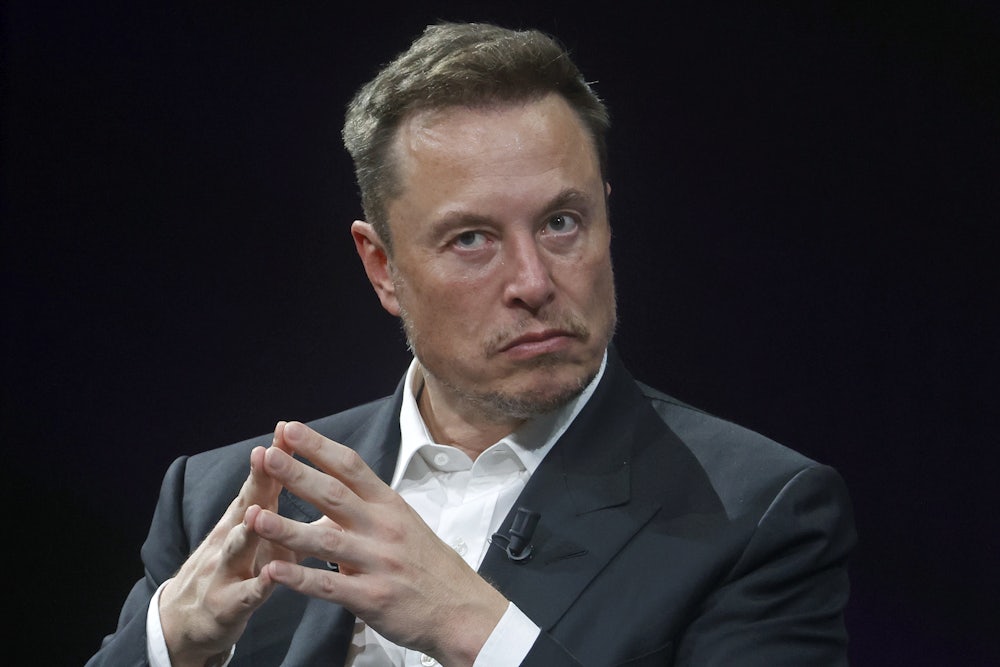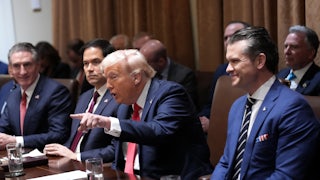The second Trump administration is waging the most aggressive war on the American constitutional order since Appomattox. President Donald Trump selected Elon Musk, a South African–born tech oligarch, to serve as the head of the “Department of Government Efficiency” after he took office. Musk has spent the last six weeks working with a band of longtime allies and young men to seize personal control of the federal government.
To that end, Musk and his DOGE allies commandeered the White House Office of Personnel Management and sent out legally dubious emails to pressure more than two million federal employees to either quit or retire. They captured the Treasury’s highly sensitive payment system and have reportedly begun rewriting its basic code. They even reportedly took over the General Services Administration, the federal agency that manages the government’s property and assets, to gain access to a wide swath of official technology and operating systems.
Any pretense of public service has been abandoned. Reporters eventually identified and published the names of the young men working with Musk on the Treasury payment system. When one person posted them on Twitter earlier this week, Musk stated outright (and falsely) in response, “You have committed a crime.” Ed Martin, the interim U.S. attorney for the District of Columbia, later sent Musk a public letter in which he promised to “pursue any and all legal action against anyone who impedes your work or threatens your people.”
There is no precedent in American history for anything like this. Musk is a private citizen who has not been elected to anything. He is not a federal employee; he has not been confirmed by the Senate to any office or post. (DOGE itself is technically a hollowed-out version of the former U.S. Digital Service, a White House office, instead of the outside consulting group that was originally pitched.) He is not abiding by any of the ethical or legal restrictions to which public officials are subject. Spending a quarter-billion dollars on Trump’s reelection efforts has effectively allowed the world’s richest man to buy the federal government itself.
In doing so, Musk is defying Congress and the laws it wrote. Republican leaders in the House and Senate appear all too happy to let Musk wreak havoc on the agencies and civil servants that help keep the country running, even if it means neutering their own branch. Congressional Democrats, who have struggled to organize a coherent messaging response, have few tools as the minority party to actually stop Musk and his agents. The Supreme Court has not yet had an opportunity to weigh in, but it might be more sympathetic to Musk and Trump than to the “administrative state” it has fought to rein in.
Musk’s current bête noire is the U.S. Agency for International Development, or USAID. Though obscure to most Americans, it is an important federal agency for the rest of the world. Congress established the agency in 1961 at the behest of President John F. Kennedy to act as a counterbalance to the Soviet Union’s foreign aid efforts. At the time of its founding, Moscow had purchased influence throughout the world by handing out billions of rubles to prospective allies; Kennedy and Congress hoped to match its soft-power efforts.
Though the Soviet Union is long gone, USAID survived as a key tool of American influence overseas. It disbursed $40 billion in aid programs to impoverished and developing countries around the world under recent congressional appropriations. Those programs range from funding HIV/AIDS treatment in countries hard hit by the epidemic to supporting civil service organizations in fledgling democracies, to providing humanitarian aid to countries at risk of famine. Lawmakers from both parties have defended it both on moral grounds and as a means to counter China’s growing influence throughout Asia, Africa, and South America.
USAID’s foreign focus, however, also made it a logical first target for the Trump-Musk assault on the constitutional order. Musk has denounced, without evidence, the agency as a “criminal organization.” He has accused, without evidence, Democratic lawmakers who defend the agency as beneficiaries of purported USAID corruption and bribes. USAID’s actual beneficiaries largely consist of government contractors who may be too scared of reprisals to sue the Trump administration for breach of contract or foreign nationals who may lack standing to do so.
Over the past two weeks, Musk and the Trump administration have steadily driven the agency into collapse. They ordered USAID employees to not go into work at its D.C. headquarters and placed its leadership staff on administrative leave. Trump appointed Secretary of State Marco Rubio as USAID’s acting administrator and folded its active operations into the State Department. Politico reported on Tuesday that the administration next plans to place almost all of USAID’s employees on leave this week, a precursor to their eventual dismissal.
Merging USAID into the State Department might be justified as a matter of policy or efficiency, in which case it’s a matter for Congress to debate. Outside of that, it is indefensible on legal and constitutional grounds. Congress established the agency by enacting the Foreign Assistance Act in 1961. Congress enacted laws governing the federal civil service that insulate most of it from summary dismissal. The Trump administration is not even disputing the scope or meaning of these laws; it is simply ignoring them.
Trumpworld has defended DOGE’s moves by asserting that the president is taking proper control of the executive branch. That view is historically illiterate. The president is only one man. He cannot personally collect taxes, investigate federal crimes, deliver the mail, or do thousands of other jobs at the same time. So Congress has helpfully created and funded hundreds of federal agencies—and paid the salaries of millions of civil servants to staff them—so that federal law can be carried out.
The president is not powerless, of course. He can supervise and direct these agencies within the bounds of the laws written by Congress. He can nominate people to fill vacancies for Cabinet positions, agency heads, and other crucial positions in the executive branch, subject to Senate approval. He has some enforcement discretion over criminal prosecutions and certain civil enforcement actions. He can set policy priorities for agencies to pursue when using broad authority granted to them by Congress.
In recent months, Trump has lionized the Gilded Age as a more idyllic and prosperous time in American life. In reality, it was an era of extreme wealth inequalities, widespread political corruption, and monopolistic corporate practices. Americans responded to it in the early twentieth century by ushering in a wave of progressive reforms. Congress set up new federal agencies to improve the public welfare and address social problems. The Federal Trade Commission stamped out anticompetitive business practices. The Interstate Commerce Commission challenged the railroad trusts. Some regulatory agencies, like the Securities and Exchange Commission and the Federal Reserve’s board of governors, cannot be fired by presidents without cause, to preserve their independence and prevent corruption.
Corruption, whether in fact or in appearance, also motivated the earliest civil service reforms. Presidents used to be able to dole out federal civil service jobs as patronage, in what was known as the spoils system. It naturally led to corruption and inefficiency—and that was on its good days. After a disappointed job-seeker named Charles Guiteau murdered President James Garfield, Congress passed the Pendleton Act in 1883 to create a merit-based hiring system for federal employees and protect them from unjustified dismissals.
Trump and Musk hope to dismantle this post–Gilded Age system altogether. The president’s hatred of the “deep state” of D.C. bureaucrats, whom he blames for his first term’s failures, pairs easily with Shadow President Musk’s hatred of any regulatory constraints that could limit his businesses. “Regulations, basically, should be default gone,” Musk said recently in a group chat hosted on Twitter. “Not default there: default gone. And if it turns out that we missed the mark on a regulation, we can always add it back in.”
Musk acknowledged in that pseudo–town hall that he hopes to deal as much damage as possible as quickly as possible. “If it’s not possible now, it’ll never be possible,” he told his allies, including two Republican lawmakers. “This is our shot. This is the best hand of cards we’re ever going to have. And if we don’t take advantage of this best hand of cards, it’s never going to happen, so we’re going to do it.” (Musk has previously suggested that a Trump administration would engineer an economic crisis as a matter of course, promising supporters a period of “economic chaos, a crashing stock market and financial hardship”—the prospects of which become much more realistic now that he controls the federal government’s purse strings.)
It is hard to predict exactly what the Trump administration will do next after it finishes off USAID. One cannot help but notice, however, that the administration has taken similar steps against the Consumer Financial Protection Bureau. The White House forced out Rohit Chopra, the agency’s director, on February 1. It has not named a nominee for Senate confirmation to replace him. Instead, the White House designated Secretary of the Treasury Scott Bessent as its acting director. Bessent promptly ordered the agency to stop almost all of its existing regulatory work.
The CFPB, which was established by the Dodd-Frank financial reforms of 2011, is dedicated to policing fraudulent and abusive practices in the nation’s consumer-facing financial industries: mortgages, insurance, debt collection, credit reports, payday lenders, and so on. In short, it exists to protect Americans from predatory practices by capital. Unfortunately for Americans and the CFPB itself, those predators donate extensively to right-wing politicians and organizations.
Republican lawmakers have waged war against the agency since its creation. Elon Musk, the world’s wealthiest person, said last month that he wanted to “delete” the agency outright. Through litigation, the CFPB’s foes managed to persuade the Supreme Court to end protections that preserved its independence, allowing Trump to install his own leadership over the agency during his first term. Payday lenders even convinced right-wing judges on the Fifth Circuit Court of Appeals to declare the entire agency unconstitutional at one point because of its funding mechanism during the Biden administration.
The Fifth Circuit’s ruling was ultimately overturned by the justices last term. But it would be a mistake to interpret that ruling as a sign of the court’s favorability toward the agency. Indeed, if I had to choose an independent agency to dismantle that the Supreme Court’s conservative majority would care the least about, I would choose the CFPB. The court’s conservatives have palpable disdain for it. They often find themselves sounding like the Continental Congress decrying the British Crown when writing about it.
Take, for instance, how Justice Brett Kavanaugh generally described independent agencies like the CFPB in a lawsuit against the agency while he served on the D.C. Circuit. “The independent agencies collectively constitute, in effect, a headless fourth branch of the U.S. government,” he wrote. “They exercise enormous power over the economic and social life of the United States. Because of their massive power and the absence of presidential supervision and direction, independent agencies pose a significant threat to individual liberty and to the constitutional separation of powers and checks and balances.”
In the dismissal case I mentioned earlier, Chief Justice John Roberts warned in his majority opinion that the agency “has the authority to bring the coercive power of the state to bear on millions of private citizens and businesses” and could levy “knee-buckling penalties against private citizens.” And in the appropriations clause case last term, Justices Samuel Alito and Neil Gorsuch dissented outright, complaining that the agency enjoyed “a degree of financial autonomy that a Stuart king would envy.”
Like one of the Stuart kings, other agencies besides USAID and the CFPB may be on the chopping block. The White House is reportedly drafting an executive order to “eliminate” the Department of Education, a long-standing conservative policy goal that also cannot lawfully be done without an act of Congress. With lawmakers either impotent or supine, the last independent check on Musk and Trump is the Supreme Court. And if the court either rules in their favor or finds its rulings against this misrule ignored, then Americans will only know government by Elon Musk, of Elon Musk, and for Elon Musk.










